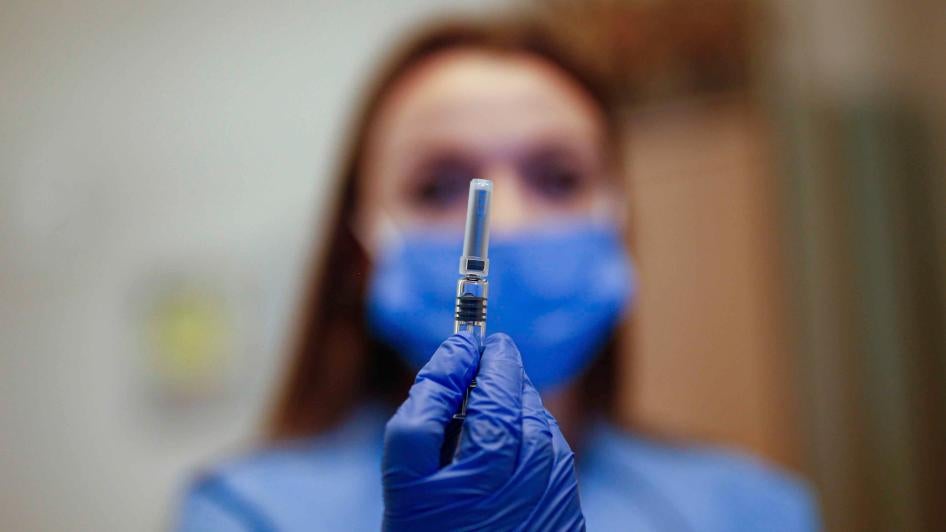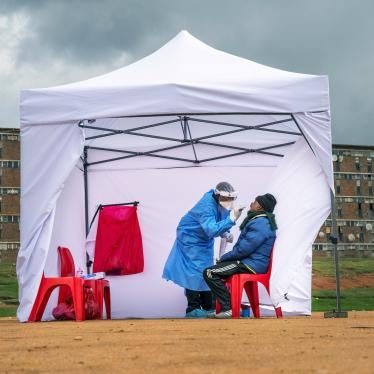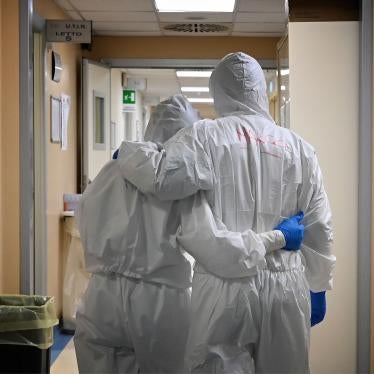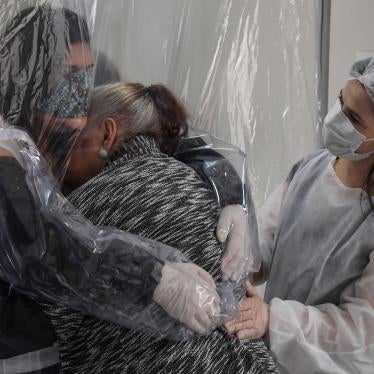**This piece was co-authored by Zione Ntaba, Judge of the High Court of Malawi, Rodrigo Uprimny, Commissioner at the International Commission of Jurists, and Zak Yacoob, Former Justice of the Constitutional Court of South Africa. Full list of co-authors including Tirana Hassan located at the end of this article.**
The Covid-19 crisis and measures taken by states to mitigate, prevent and contain the spread of the virus have had an immeasurable impact on lives and livelihoods of the nearly eight billion people on the planet. The pandemic and many state responses have brought on what the United Nations Secretary-General António Guterres has described as a parallel “pandemic of human rights abuses” and the exacerbation of poverty and inequality worldwide.
The World Health Organization has called on governments to place human rights at the heart of their pandemic responses, including by ensuring universal access to Covid-19 vaccines, therapeutics and health technologies. They are globally understood as public health goods and access to them is part of the human right to health.
Despite the repeated rhetorical references by heads of state to the right to health, some countries continue to oppose a waiver of intellectual property rights first put forward to the World Trade Organization (WTO) in October 2020 in a proposal co-sponsored by 64 of its members and reportedly supported by many others.
In effect, these countries are blocking attempts to universalize access to the know-how, technology, and materials required to manufacture Covid-19 vaccines and therapeutics.
While intellectual property rights are not the only reason for inequitable access to Covid-19 vaccines and therapeutics, they are a significant barrier. Similarly, while a waiver is not the only means to tackle the lack of access to health technologies, it is an essential element in facilitating equitable access.
Existing intellectual property flexibilities are demonstrably inadequate in the context of the Covid-19 pandemic. Moreover, there are ample precedents for WTO waivers, including in the area of intellectual property. The 2001 Doha Declaration, for example, was partly implemented through a time limited waiver furthering public health objectives relating to access to medicines.
The opposition of powerful states to the proposed waiver has been met with concern by a range of UN Treaty Bodies, UN Special Procedures and the WHO. It has also led to a worldwide campaign for a people’s vaccine and a complaint to the UN Committee on Elimination of Racial Discrimination by a host of organizations alleging that the United Kingdom, Germany, Norway, Switzerland and other countries blocking the waiver are “prolonging the pandemic” and perpetuating structural racial discrimination by doing so.
Member states of the WTO were due to meet for the 12th Ministerial Conference this week, in the context of the ongoing Covid-19 pandemic which to date has killed at least five million people and dramatically damaged and disrupted the lives of people across the world. This high-level meeting has now been postponed indefinitely due to concerns over the new Omicron coronavirus variant.
This development comes at a time when lifesaving Covid-19 vaccines and therapeutics remain largely unavailable to much of the world’s population, a situation which is particularly severe in the vast majority of low to middle-income countries in the Global South.
Most people in the Global North are now fully vaccinated and some may even have received “booster shots”, in clear contradiction to the WHO’s call for a moratorium on these. While more than 50 percent of Europeans are fully vaccinated, only 7 percent of Africa is, leading WHO representatives to tell UK MPs at a meeting of the all-party parliamentary group on coronavirus that “this is a disease now fundamentally of poor people and poor nations”.
This situation persists despite the vast majority of WTO member states bearing obligations under either the International Covenant on Economic Social and Cultural Rights (ICESCR), which covers the rights to health and science and the principle of non-discrimination, or the International Covenant on Civil and Political Rights (ICCPR), which includes the rights to life, equality and the principle of non-discrimination.
On November 8, the International Commission of Jurists published a legal opinion on the proposed waiver. The opinion, which has been endorsed by 140 experts worldwide, argues that member states of the WTO who are also party to either the ICESCR and ICCPR have, at the very least, an obligation to not oppose or obstruct the proposed waiver. Where such states obstruct the proposed waiver, they are acting in defiance of this legally binding obligation.
Whatever the reasons given by states for opposing, delaying or otherwise obstructing the waiver, and however they continue to justify deeply inequitable access to Covid-19 vaccines and therapeutics, the impact is clear: disproportionately increased Covid-19 transmission, sickness and death for marginalized people living in resource-constrained countries in the Global South.
Furthermore, inequitable access to Covid-19 health technologies leads to a greater possibility of the emergence of variants and strains, as Omicron’s identification vividly demonstrates, prolonging the pandemic itself and the need for stringent measures such as lockdowns which threaten lives and livelihoods further.
These are the unavoidable realities that representatives of member states must be forced to confront when they deliberate on how to exercise their standing and voting powers at the WTO’s 12th ministerial meeting.
No amount of political posturing or legal obfuscation can conceal the simple truth: in prioritizing the commercial interests of profit-making pharmaceutical companies and accumulating more Covid-19 vaccines than needed, states opposing the intellectual property waiver at the WTO are contributing to continued sickness and death for people in poorer countries.
Worse still, this is despite a number of states in the Global South having long attempted to ensure this unconscionable situation does not occur or persist. History will judge the WTO, its member states and their representatives for the lasting impact of their continued deliberations on an intellectual property waiver. It remains to be seen whether that judgement will be one of condemnation and regret or celebration of a victory for human rights and the rule of law. The decisions taken by members of the WTO in the coming weeks and months will serve as a precedent for how states respond to global crises in the age of impending climate disasters and future pandemics.
The article has been co-authored with:
Manuel Cepeda, former president of the Colombian Constitutional Court
John Dugard, former judge ad hoc in the International Court of Justice, former UN special rapporteur on human rights in the Palestinian territories
Sandra Liebenberg, former vice chair of the UN Committee on Economic, Social and Cultural Rights
Anne Skelton, member of the UN Committee on the Rights of the Child
Aoife Nolan, vice president, European Committee of Social Rights
Dire Tladi, member of the UN International Law Commission
Philip Alston, former UN special rapporteur on extreme poverty and human rights
Magdalena Sepulveda, executive director, Global Initiative on Economic, Social and Cultural Rights, former UN special rapporteur on extreme poverty and human rights
Agnes Callamard, secretary-general, Amnesty International, former UN special rapporteur on extrajudicial, summary or arbitrary executions
Tirana Hassan, deputy executive director and chief programmes officer, Human Rights Watch
Lydia Zigomo, international programme director, Oxfam
Sam Zarifi, secretary-general, International Commission of Jurists










